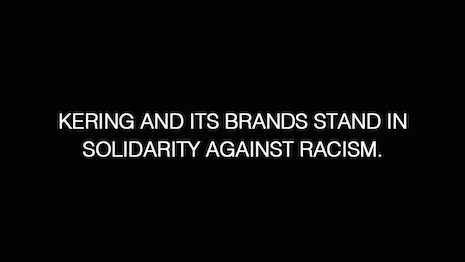Luxury brands across sectors took a stand to support Black Lives Matter and promised to ensure equality in their companies. Hiring an officer dedicated to monitoring and enforcing equality and diversity in practice can help meet those objectives beyond tokenism.
From ensuring equal hiring practices and equal pay to establishing the culture of the workplace and the tone of outward messaging and marketing, these executives can help the CEO establish a diverse and open brand that is welcoming to all.
“Many organizations that are committed to equity want to find someone to develop and oversee a strategy,” said Lauren Romansky, Boston-based managing vice president in Gartner’s HR practice.
“This person can serve as an executive coach, supporting their leaders in confidentiality and competently talking about issues of race, gender, ability, class and other identities that can affect the employee or customer experience,” she said.
“Equity officers can help re-engineer processes to ensure employees are being met where they are, and equally performing and accelerating once in their roles.”
The role of diversity officers
Nordstrom, Neiman Marcus, Jimmy Choo, LVMH’s Hennessy, Ralph Lauren, Moschino, Bloomingdale's and Gucci are among the many marketers that showed their solidarity against racism when the George Floyd protests first began on BlackOutTuesday.
Some were called out for not acting quickly enough - Nike beat them to the punch by a few days - and others for not giving money, even though they immediately donated money when Paris' Notre Dame Cathedral went up in flames.
 French conglomerate Kering and its brands such as Gucci have a taken a firm, bold stand against racism and police brutality in the United States. Image credit: Kering
French conglomerate Kering and its brands such as Gucci have a taken a firm, bold stand against racism and police brutality in the United States. Image credit: Kering
Luxury brands have been known for moments of tone-deaf fashion lines that are insensitive to race. Having an internal diversity officer review processes can help a company stop these issues in their tracks.
“Depending on the structure, equity officers can also own outright components of recruiting, CSR or even supply chain,” Ms. Romansky said. “Inevitably an equity officer’s impact is contingent on a large stakeholder map, but one person can own the approach, measurement, outcomes and associated team.
“We haven’t seen a lot of hiring around an equality officer,” she said. “More common titles are chief equity officer, chief inclusion and diversity officer, or a more traditional chief diversity officer.
“All of these roles generally include diversity and inclusion outcomes, and leaders see equity as a means to ensuring ongoing sustainability of their diversity and inclusion strategies,” she said.
Defining their role and tasks could depend on the company. Their objectives are still somewhat malleable since this is still a fairly new title in many companies that have been around for more than 100 years.
“The roles of executive leaders dedicated to diversity and inclusion are all relatively new that there are not necessarily relevant benchmarks,” Ms. Romansky said.
“Many diversity officers also influence internal processes, partner with marketing, and even coach C-suite executives in supporting their leadership on inclusion,” she said. “In terms of the labeling though, of course, words matter.
“Most executive leaders on this topic are focused on creating sustaining diversity and inclusion approaches—not something programmatic or person specific—which means creating an authentic, true meritocracy that mitigates bias in talent processes from all sides.”
 Gartner's Diversity report. Image credit: Gartner
Gartner's Diversity report. Image credit: Gartner
CEO’s ear
Savvy CEOs appoint an executive to lead diversity, equity and inclusion and this executive has the CEO’s ear. This allows the role access to the business leaders and, often, the board, and puts them in a position to advise on the biggest decisions the organization will make.
“If an organization is trying to convince stakeholders that they are indeed committed, this can support that perception,” Ms. Romansky said. “That said, the equality/equity officer would still need to work on HR processes and reach into compliance, marketing, supply chain, CSR and other parts of the business and, in some cases, their senior spot on the organizational chart could actually hinder progress.
“It’s important that the role isn’t just an executive coach and figure head – the hire needs to really get into how the organization runs,” she said.
“We’ve seen several successful diversity and inclusion functions start by reporting to the CEO, make a lot of progress, but then actually move into HR under the CHRO to ensure talent processes are truly consistent and unbiased – which is often more easily accomplished within the function.”
As citizens around the globe continue to demand anti-racist practices from leaders and brands, the equity officer will likely be tasked with reviewing outward communications to ensure appropriate tone of voice.
“Equality/equity officers will spend their time understanding, listening to and learning from underrepresented talent segments,” Ms. Romansky said.
“In moments of crisis or unrest, where employees and customers are looking for brands to express their points of view, this additional voice that will, by nature of their day-to-day work, have a pulse on the topics can be extremely valuable,” she said.
“That said, one person should not speak for any and all employees or underrepresented talent segments, as there is certainly variety within any group.”
{"ct":"bSEkg5o1tWFUDPb43oGzaTLWkCnkOfSfpQE1WF7nz8AuEZVKJ1NA7izsRJnLTnrd57oVd9y5xIGzgmPUUgNZ\/JxKe02tNc8VG7NY36813jrkYBl+Gx7rmXk5ju7I9D90Jdc9NAvyrP7AzJNbcMKIefLy2KihWJdyuLU6pGSr4qpeaxBkpEa9j1L2bV4Z0dTzDFjy5OtNSfoBVPXNofN9cQBjrQnIiqLUkWbEqS+GgGnKm8l4YrBBbRp6ivntJYZHS91WtAxtt6E5OGbq1fcgb\/APUYnVtFdsa+XEa1UvxXvbqw40W\/5YLoe8+czHnpAR4EGiAqKDF+smMxnrgcBRkKDgP+cSeiMxDzCBYrIuuO2KSlBM\/YOh4FpqhYjOfW4mDbU+AMV8YHsDB96MTjjPxrOkFROyhR0e4up3fiDkskLOmRzJA\/v2rt7daG3worojReYxNO8PYeIxQcVISubKBZhUZUYHSWqrrCe1ygE7C+ER9r3pyTYalRImUT+ZSiOkJKZ5WbsTLfHj601OETFkUsAPx8PRcNleYEwO8yde3BaP77CUEQF7l6k6wyJIP0rnRqd25IOMMNAZoBHrAY1aYQSise686bCy6O9nPX9aw2ybK6WwxRDIj3R+LEZs6y+ad5n9KGXbt8Qj7sbuMD8dZRGO0X5JwZB3cxgL8kyWu\/U\/+PDf8qka5ou8N8qThzHYiQQXz873Yo8b8S8b2+UiseGfUYxCm\/p9gaszHhfxky9uzrpN5aobrO0Xy0fglHFydL9Ur1ZPPMYfw6NTuZYECeX8cQyjdtqzeb8xI+GQgZbXiwC9Kpze4qfQ2IaC\/zDrBCkJCXMovzhPLirW1AjYYMcMNqZO\/elwXXx\/6EDdWHd4nzRIK4NfA95\/yimt5DzzBCzIxT\/Y8jOw1Thycs4TOG6Dz\/4bsZDtRaKmG9g\/+I7MRyjcqW5dR+D3X60AyrrEFTqTRxyTud6K7pQZRyI5X2ipHdEEN8QNMMFBXa2KZfnqKwyzIF5MTyalXMYWmF1C1btS8HguMdRKlIcImY6qPq66NCg8\/kYkgrmk42wGjnvrVvmLnPkP\/m\/PhT4I94+w4roh064+8KkjpZglKEb9zlwb7VDjLlGpiLXU\/PMu8lw2LAwv3l3Q3HC1VKHle25PyGGLdieRdNhU2oiMBRsewt2BCorIxtNgxcC4lvC6OCI9sycbJkYdFAtJkFaG1wOeUbuMFzjDYyvaOM6q4467ryd\/y6h6UQKXZXiAU2AMbnJepJ0hITfkcnJX61+GbcrZCrm7cmGaYo1nsHkYcL4uY3rumGfUVdKEoaVXcufT4tsdUStYwdUTbGBsOQsxkisaJQ6jKafDiz38JBNd6ZRZWVM5BU5OgkuXl02ZcSl6mcywk8IB6nD\/29j27TAosB+cs9sZRCFM+Ej3VVzZmEELrYIh48iJ9hN\/1ziJ3jL9uop1J6hL+crnjlTP\/WKDwvX\/YQhQumK\/wzkXDWieK2u520\/SNjrMM1OdoTab4PMa4u9iOlM+fXnYhAMjfGFCecOTfuL5nIZmxHTVKtvsJcdZw2rKyjQq4Lghr2z0yAHto7GJKQ\/tL2\/BT4\/ZF\/2stWmSXWmP35HRZhBCcuAdMd0yaFHmXtW2VphrlqJONnrDbclAzNac\/OydvpNc5fW8xWmJQcDbXZ\/5Yuo65ifM1WHPzQ9syB9r4Imc8nJYvoYvFNfjuiLyahqbXkyic77dDTjk9Oqb5zXXG0xzU62dtbXrAo08teaX9dWkoDKx+4Ciq4N91h4CAu0zT8IMvkwJW4MdRvG7UALFJylF97i3UCl8S63hOVT94HMDiScqgH\/25BrkxK435k6BWZeIBAn9LeXngosniqxILncWe95KixWGzAImmw8HrpZL9bBJwBAtGgwB1RuWEBDV1haa4RtjW7o6eZV3IOXaheSoCxjtNREmFDkxWvpsy5POvnPKq11SQLtgCXliGkynrnUdz+SPu+YL3qkxOcstWK4w+ssdAOr\/dKAhjjNDgcQeTcQDpv8VPadOEa5z+4gqj3HkZiOvJDgUrMTLDlbZuApdqeQOtKWaDlBW\/rYuEGDSh7Ci2271AYEdXz2d4Ce+iQVv1HA5bfgOmvSfJ4gp0DQfzjMuzkh7OxSvXc0UOl+SHKEbUkRxnKow6oJpAO3Gibgulqk9CFxWSfk\/3R8ST+1oDxKOMuKUFZ22R9VfnEga3+IFy1nr444Lc\/cgwpqNW4FJgQmnjn0MlgdJviJoh+4Tg021wPgg9jHkxWvOMLImY6FQgklBkA7JhKC6baVpJmn8n7nvSEmWuhVIYlerbztz\/VaJM+aFskJSGvzLSPEcSvq0VPRJrlqyf4SHZj\/GDCbFKDIiR6AJE+JBkEEdzcj3ntR4bUVu+c8yo7Hdm3Q\/KI3Z4TIhi5Xq4Oqz3k9COglSAOL3aPulHuU2AeazpNzLaqQp9zFv6EjlveXTX776NqCJmxNzZEu\/cvIHVxREa3sHXrdFrMzFK2rDIWRhUSjGZ3JxvgKf6OOwa+rD88RmVp0As5iV8j7e5AzEM9xcOr4dZoaHTDxl7JacIxHzzDs\/O2Mi6wJHInwiJxm6oHZghamN7ClW1u\/f8uBm7P4vYhLEw0lu278KlkApjgltG6hGPH4d8E+fQ9vOGDHhUGZQxChTshsUY9nzG7soQQc0LRc+XyXicLboQlFUbmsu71Cn6nc3MDeabRFx+YVd2IAiVHb9DBkAmHAaif7wQIR+KLsr1EVzh+\/qQ93EMQGGaUNK4bcUOEn2qFS5ovpufkBdUs3qaZ37q4aXXvWAkJrG9LeskdF1ZcRWGOoXwW9SluO6+iM0V8RR7ulPNl3gvTkB4+ygltrODLWWp7x9HY3m5dlVTQXhx9GZGUS3GtckGMLS557Kdakx5qUSv\/pHqSi6dHFI9TNe0NX7ZFBcjigbI1evUwVZOkdRp8A+CVtbXyxppvOTuZUmHFExtwb3Uw7zZfuInTl8ckE6UkSXWx5wvVkd\/1iyDYEXWjpK6yDQCNuqFX34tvh8ZzPr\/Zmm5hiUenxZt3QE8desr0qIYpQK87r+PLqFVg8JJk+ooZwUitBx4j+YbPLIUfVPt2tYDuwLzjZO7yRab9e\/yD+4jZYTQP5ZaC2ovVnr+UwpsLkssL1q857IFlO7BHyST9RNXxgdlm8o7BR3akzdYV0BJyd6IF0WaULtH+tL6Zw6C2S0CKl6\/RW1Zmd+d5ptsN9BDm22EgQoBl7ANQ8CgC6HqBQpHycLP+W3kV3HBxDtGrzh\/QfRUNoTrRghVEOHSfqZqFsKyz4tUieGgngEZWqjyyuSCqlfmBJj8xWAUfiX57MnieF8kpohVlHjVDy83NoqTVOQ8WWsohnuNCN\/VBlUZaOYC5r1Wlzh0g0fPQlN02pVvX8nZDY2L988FIV9UC+aqVjKi4MD5mltxJy+f9OTal9YmU0ZY\/N0Wd2mBHzjefELmgflhhEEM3Tm\/HKpN8lmXt1RJ32CdNqhYNsA3VTbbnQ93Gv1ZhS\/1yTzx51h+DrlLKAhz3U324ETrrJRAgzvET3BwV436mY+KtJinMG5nlY5aW2UddgZkcG39ZP17VT3Zsh2P\/Ih5Z66qwvZtGHNNVq70itgbBkgDpVKxgXrHPOdYlaKOEWwCoP66EknCZW1zWdn78gw7F+XywIAt\/Mf5519BP6nHoqciyldR6jIcs1lr9RXrsxZsLjkpHpDnVWuDYI+Uk4bAux+0Qf9IH37ArjygfrtnMvmuRbSdgLsdo2ihJWh1vziZIx5H\/BXCnEVKzfMSH19NPUoCz1oIzt2++lej9WNGc+oPOpvoMSmrQ5B71XBXolacXHZqOslHpUExq3dd2Y1L8nJXMmkZBYtPvEhCeQjolcv8M\/izGR3gv0lNQjLfRz9BV4R\/IRYfIy57iK612q+YieAnQWG71Q1V7PfpC5RqBxvNbDE8wrs4JXVMB0o9hY0qJKtWmHw+Amu011qKcox5fTy63Ku5YpwmCqPqOwWgZ2Q855Auc\/kG3ZysmYxfyG4Qi4xkeoYSdaCPb6VEdx5MfkDvK6r3C8x6VZP0Zf1HR3D+Disxo+MoKm2uuNyMUlSW\/BVrlkM8CQPC1hYV5J4FoYHmHzmnEFT\/1PoOWjaNAN3lNRCcj\/6569kO+FXjkhvvFYkWH+yWqj660Z+Y9gyA6ug2PbeElfXC2+huEDhkFMJk4aLEEst70rrqEXkclpGzq45KpeTtXfe924UCTtn+4rkq97OzAH+MO2bzaQfBfb83QB3hTIcibrAwYdBtYoEC6wybmCGBdgi4VAqhvyI5ldSUzQ58yXWKAaToN7prI7EjVP2K301tzQ0U0AO3mXhZGNWlWLA5ic7KYLEDr5Y9E9c+846klMT1pKydRnDExmgoK3FbmlHhXchn0Q1wv3xLgxLw23aPZc9L64G2y7Y9JhDwP1cwqY5agKx56LiPypdxxNhckcyNyk9uYW\/9USEMHPSKhAQmE0Gk+0vADGuPz9blSxddgdNWVbdStcqB638U5CuYkCF1+nOmOQI0AR\/kppGGStlP9lRw0KUylMhlvBeHFZOGcbLKEM98o2UNNiXMcFin5twlRjmYIanBETUGvDnu6vjLrRfGtb\/OAlAd82I2dmcTkbWBlneGLb4cXz38OQ1h5K2EWceAIBFOn4wk6YWC0gAxV1RgtDPkWtNA4RYM\/xTYBT4Jn56CsUjNwQ+TjtEH+H27yowen5gStcnsmaulxmHU891GztVWtEmzBX2tb4ln3wQ+pjhK2sx09q1ihjOOKosQXtott7b0o0QtUdihP7zN6kGz5CUfMxQ5aOhJsSyiSvLOlEstYiiCEb8+9EgQMD9E4VuRZ+eSefkL5EvyAc2PO6VqIMisuWt6R4Vpa6fBV8DhfXgwwogHcWtAIk\/OWeYSgRhB+GUqFM\/blu1UInnHRuwafty+ZxmBNF97oCGUe8YQyQJX\/9Hzz286QvELVfEYxeZ5LU0eGNu51H6\/JOpvxS3kgHIloiM07pI5soSpRfBRM4iUyQOYMRykvfzrw\/XLO4ly0Qbd0AVSL7KqGjbXIKkbyril2TND5XLJMKxKoFievMno05NYC+OZW5Ge6qltf7ThjWQqmZEwK62xngaJH4NVLANLYQ6HAtclT+CpR6MV0RPRDNkkmoIz7NnK6eAZTiW85qxKRa3Vnn\/ItE7V+LL8+uKZ4sWKDXvo8jES1m7+xB0LBImAi5nzm2sqxy3GJ9xO77Ktdn1+E1KeU+c9fcQ+eEYM5nxUDlc91St4rKRy9XIiWftk4a6FBsqfVzWdVt3aosyBH9q+ANN1Olv84Ri\/RQDYfUwyAQsUDRNGkLrzBn+D0pys+EcRpqm\/B8j5J+pPvXhD5mWCESfxXmKU5tjWbvtnao8LZAJmMYKRl9QnSxBWxCxYviMDU4yQd+xx4bxraoUALVlur5p63WKDYV1ku+gncmTmz0XPfMRcSIweNYzx+XN+37I7XNUb6W5WpoA0io+HubTJo0ABwoOdhvE6o8XgcpbwyR8GRgCI1oAT8rO7jdpgZwXDcP63iT1tLq+ZNhaXOoWaDC2s2OPX2Wkat2ZtqifkdBZe1\/ysLEptsHllferrek+NoPW96GUdP73mcEn2VrpA27SNmUhErPfYt+udKhwJwoZKWl5PP3mbSkohdooVijMOdAGOQraRg2uVRnEFGikkfUl1\/kn7k40jy\/byQ3mFpdDyQfvQ5D21248mU3xUwGH2kUTAxo1Dhwabu+PfrNDqbHSHvIUS8TDZg+ZaFYOSQxrVjik06rjkAomQPjfagQr2V0opAMPq9j0Mtq5F0v4bTUnnZW+GSFwiZgMLfYx7wvHnsyPn\/Ifl3JQ8lCIvnJE10WnYllSdVSLJ8IFXLNcmmAw80TN51FjathJ2OoxepLzbGha2j4KrFTEkBiLM9b3j0PHENiSEKNmzq+zu6RY8fuGlwsysuiJFjdJiLfWALXh8q943\/Z4Ekg84vBiZvWhekVjaImpToLpTclUAydmn9K9MSg8PYZoOh6C4IDyXkPsAoWbzYr5vFwQNtn9WqZFfZgxSBRQXW4Sq5QoGhb7Abbj2R8hq93xDjkbAMb0Q0LdU0EhIYmbBGNUJilpc0k67vHMgP3edAV0b3OLldapatyh015eKwo00CRo8v2wMgXNSX+eqNrEUnHTDVuHa\/n4Xcpg\/BWLYqAM3sk3CP31ZkaLTFuQIOMeqCrroi7n3lLArUlONRqJs9SXOTSiyRzQMcli\/S1gUkEOrgvFrzMtHRkrr8Aofi+9Zmd7n5MyC+JlI43Kfz2XCt9gD\/K98WfH2BVdlgF+D05h5UJGM3\/QhFwpLpVMFZqWJMqYxn3sVV5lEusBHGxipCe7XZnlZtSBMpglv5+d0Af+0T1l+rwPoOE64i5dEAkK55Y3jv2i5q5UXKkkD217VLGtIyfp7ahyamLgQOAJGrgFy6XiJspd5r3ttGVoyPkAlvDP7Nlr\/WQSDUbFSyOaMTOH2rTjjcFihPY2YnFA38B1MRA8NGc9CBDp8FxB1Hv7I\/vxI\/8iLYwsWzGRvsLwJNvC0p7YHUlsHLxyS3ACEPoC8jL9ZhZN5dW74UyUmVEJr8KIDir2+TpvCZb7\/D+UHJyYjncRzAXbmbpcvX8roJbpg9A6h1i\/d9r+FFK1HU7Q6cFivWN0u4gikPsi44lEs1N+SxYDfd1xECiPR\/D6fMgOXaKhB\/JuOKNqxR7RMiGNcrpB8Jy\/KQsZXx9TFcoMjwqmQ8G7Vot2iRuqZsfgJhMGp3f3ar0dsKvWtvgxIZsoIDCqiQAL3xqwWVgMFsi90HuvMVzn+jAMKQSACjwanz7jVqkZET5hHbLlLQWOZJNYGEwo1ukyepa+XBLRtRE5M0ftvxp0I61QDeSEu4gKYIRV4au6pJK6xj5TXV0Xg0bI5n1Tp7TPxlxGBl2q88RDP6pIBdgRU\/13Xa+VgQAg1py0ONMm9ipzU6gz1Q5NeR7gAWHPxO4+fsMkXPYXQp8P5MPMZ3CS9Fuyzz+qwK38ZZl9xlGYpTCInZkzAJslnkXAzhSVHwZBToolBFqA46gF2Yfh22pcFYSP5qx8JJw2EIMZ33NFUAS6Jtfm3sv3zH\/MELjjD8ql2eKW+tUG1ala0vp6q+8XYYPwO3PbrcZBPcwv2jm4ypo4oiP0KJczRIUc46Ll1FI+TJjECh91zbNtl9yIb7uGEIdO0XEfJjbKx+4tNFfOO2T5oDhuBrqZLWmx5pm3leAQasZSL36oetiYFnFJ7sorbpbOiKqN4ta55U5ak04OtuMxJ8O09tNWrZiGB+E0L+S5QH00LB5HCIKPcGmPS9HZmDUcVScJ60WBLwStiAVw1v6NnDHkNxNSybNM5s2uYqW8QY+hZCPL8pBwKi4cIVPQYbDhquxZeGZTPvFx6DE87GcjB+iePngpRLKfHs0u25\/sNiBjkHDBh55K42EY71MAWvcZhXvLgu\/R16wyvDLtg5N+wQHp1uWRU6ezQqF\/fqBvKiB51d64HX2WCo46fyyWtlNiV4cNo17gpNmSGhzi3XpdcCU0S7fkSSw9XvgCs8m0LuOBDKJavZCvLK+tH2PosxgchWn0XQKBxfXwrC+gkguFeN8HYqlEuO\/PTrVawNwycyZSxAyzkC\/sZEzK\/7xHpH3aIxKUuEXLTPPUJYETxGZCrnBSHuC7+0KQwuMOyASk7DUtO8rufQYEm78iHn8We1NdOv7bjjWB9RHGcAix2vdNu8D\/PZm+KqPvlAJBLGZv0xEJLTX+iiG2D5yG\/iYFWXL9FTcvmcV\/B+kty+wZD\/Z06OlSRmfNmNpXAcpgTsj1rCWeW7STWAHnC687xpHvy7Ce6kwpQBVgBLIRLaSRDyMCzq0jjMkqf6Dqbg4T7kDMpiic\/ValdjavJdN03ypIsSQ\/nWD+1HjUv75zgRwiS4RO\/rFz+0fjJ2qnNEOy\/Pxs0d+YvyR76DKBE+pGYUdjhRIaTboPFHQcMHd0BYruzoeq+Gwj6xCIVaqwcAdEs40OZTtC6oDj\/DEep3FxuiKdOLgwY2jVUy5gstu6xFVu+mlq+IyxDCIwXNY\/BMvG8OH8z\/TrZXioOGSZzX9bxMR1Jw0QQ1u2pl3oPKTDb8aHoeh6gJe3xeToqngoe+8Hf54FfZ7kRtpQ5vkWrqhFxyMbh7pBZOG+n9YCitZjazIXcengQO+WWP+9DvHV9hxafIupXPhDOpxBkv9W9bY+xogO0p5oCieJKj0dxD\/MWfaUJeKlkxZguwBuvParPjofSHspLRdxW3orvTSDExHo57xfnTHaP0cfOlngv42CuFc62X2\/cSev\/HyrER3JitKOPYphf781T3e8yGPpUlvBpYbLrAw7EcQHjzp\/EWwMFgPNpO2iUil8MEUJ\/ThJTS6XeBUUJGY5JAZESaDlCm4z8OoqxKsjUGGICa7fJBrL31QU87HUmkJaZM8DxfJbalGCkWAZD+ISHgFJ4iQqQpdB9zOJoMC0xxtqpwQJIJkaQia+s75jTNApEEfzPqVBECS71744xdVV7rs9\/ZAuNWod4G8LeQBUc\/Uz\/ty3pLM7dweKQEALg7dbcay6q63T0sbdqZif9CVKcOQOhk\/MBl7UkvdgLb5OwzQ7DyDlLQYrMhP62G5n\/EIidhC\/CUj7FsQf8CCg29b4iR6DnA8e0nHQVAAs0RHKvtMafTcmwvgiIlRvJm6aOFMHI7shUU\/xlDWID0kZo7miefVXuy7tQO4r1+ec0xrvth7BrLlOvnR3ZWPBDNoetfEhMRJs+kt0Q3cyVJskEC19VlgRxA3NAghP9Hxji02Toav+bW2fBygSIBAB5cvQHliI6qGsdBW0ZV1paB5mJTLUI0GzSC0L+aHA2MdNk87zerH1fuwDfwZTkX9YGH5Ox8jpUk0nZOJXmyWzqP2uCXUmYyar65ohaVyFdoHA7fUsFlbOEaS2YeGO1y3KW\/wN1tl1DtLRMS0fAmMmMacJ2AKLzcRg\/HyQS+R1ar3PLVOTniylp9nWDyRfROQJayrSdF2HSoz4wAnx\/8cwr+HMyOWkiv0WcQ5sx2pHINEsPPSEIy32g2KqBQQEsbDl\/OzliFg52Qnc0W52hZzGdSoeqGLjeZXfM7oCNj3TJofAKpfO2ljdE7KGq8qpM8XI1EQjwWRyQxqCe7BdYaW9VhCQNYcRjBQ35lFTNkyMrn84ENBu\/pj66UMkAQ25ZlIHhU7t4BH6J\/muv5+EceILK7QE16AQMWqXFdOB8H5mTN4sUyK+rmZOe9rks6uMgmyS2bFPDG9rIhyi9fcwcenwvEq86ur8ebCT17APFsTwaZ4mcBNF9aP9ubL9kJeLYxmoeb5ox\/ckfP4ZiJPXjSteIq8bK1autIobq8w2Db7MzOMfSuV8x64=","iv":"6a903916d47473d57ba9064f486eaed6","s":"322cfc012569d1fa"}

 Gartner's HR practice studies workplace trends. Image credit: Gartner
Gartner's HR practice studies workplace trends. Image credit: Gartner
 French conglomerate Kering and its brands such as Gucci have a taken a firm, bold stand against racism and police brutality in the United States. Image credit: Kering
French conglomerate Kering and its brands such as Gucci have a taken a firm, bold stand against racism and police brutality in the United States. Image credit: Kering Gartner's Diversity report. Image credit: Gartner
Gartner's Diversity report. Image credit: Gartner